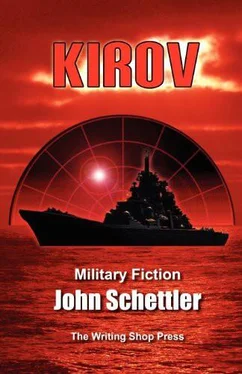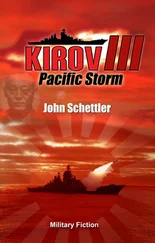John Schettler - Kirov
Здесь есть возможность читать онлайн «John Schettler - Kirov» весь текст электронной книги совершенно бесплатно (целиком полную версию без сокращений). В некоторых случаях можно слушать аудио, скачать через торрент в формате fb2 и присутствует краткое содержание. Жанр: Фантастика и фэнтези, Альтернативная история, на английском языке. Описание произведения, (предисловие) а так же отзывы посетителей доступны на портале библиотеки ЛибКат.
- Название:Kirov
- Автор:
- Жанр:
- Год:неизвестен
- ISBN:нет данных
- Рейтинг книги:5 / 5. Голосов: 1
-
Избранное:Добавить в избранное
- Отзывы:
-
Ваша оценка:
- 100
- 1
- 2
- 3
- 4
- 5
Kirov: краткое содержание, описание и аннотация
Предлагаем к чтению аннотацию, описание, краткое содержание или предисловие (зависит от того, что написал сам автор книги «Kirov»). Если вы не нашли необходимую информацию о книге — напишите в комментариях, мы постараемся отыскать её.
Kirov — читать онлайн бесплатно полную книгу (весь текст) целиком
Ниже представлен текст книги, разбитый по страницам. Система сохранения места последней прочитанной страницы, позволяет с удобством читать онлайн бесплатно книгу «Kirov», без необходимости каждый раз заново искать на чём Вы остановились. Поставьте закладку, и сможете в любой момент перейти на страницу, на которой закончили чтение.
Интервал:
Закладка:
Chapter 14
July 31, 1941
That evening the Admiralty was abuzz with the electrifying news of the sighting of another large German raider out near Jan Mayen. What could it be? Latest intelligence indicated Tirpitz was laid up at Kiel for repairs, but the Fleet Air Arm was immediately ordered to send two Beaufort fighter bombers to have another look. In the meantime, First Sea Lord, Admiral Dudley Pound was taking no chances. He was on the phone to Scapa Flow, using the long red line that had stretched from London over the Scottish Highlands for decades, hopping buoys as it finally left the land and reached out to the command Flagship of Fleet Admiral Sir John Tovey aboard King George V.
Admiral John “Jack” Tovey looked at the list of all his available ships that morning. A professional man, well schooled in the operational arts and dedicated to the Navy from an early time in his life, Tovey was an amiable, quick to smile, but just as likely to redden up with a temper when things did not suit him. Strong-willed and highly disciplined, he could be relentless when focused on a mission or a particular naval objective. Yet in the heat of battle his one great virtue was that he would remain cool under fire in spite of the temper that he was all too willing to show if things did not go as he expected.
A natural leader, Tovey was a student of tactics and ship handling, as capable a captain as the Royal Navy possessed until he was promoted to acting Admiral of the Home Fleet. He was a sea going admiral, seeing the duty aboard ship as essential to morale. What was good enough for his sailors was good enough for him, and his men had both great admiration and respect for him. The man at sea, he believed, had the best information at hand to make a decision in any engagement. As such he sometimes resented the overweening interference by desk laden officers in the Admiralty, including the First Sea Lord, Admiral Pound, who had a predilection for sticking his thumb in the pie whenever possible.
This evening he was looking at the long list of ships still operational under his command, still the most extensive and well armed navy in all of Europe, and by a considerable margin. He had all of fifteen battleships, with one sunk and one consigned to the far east, leaving thirteen of the big ships in theater. Admittedly, it was an aging fleet, but still imposing on paper. Only three on the list would be considered modern battleships by 1941, his own flagship King George V, and her sister ships Prince of Wales and Duke Of York, the latter still running through trials. He wouldn’t even have that third ship were it not for Churchill’s earlier urging that the Germans were up to something in their shipyards and the Royal Navy had better be ready to answer. Two more ships in that class would come on the line later in the war, Anson and Howe, but these three were the only true fast battleships he had in hand, and that said, they could make only 28 knots on a good day. For modern ships they had very little range but compensated with decent firepower and very good protection.
The heart of his fleet, however, were the ships laid down before or during the Great War, all aging, yet proven and capable designs, even if they looked somewhat antiquated with their reverse inclined bows and stodgy smokestacks. He had three Revenge class battleships and five in the Queen Elizabeth class. They could plod along at 18 to 21 knots under normal circumstances, but had good firepower with their 15 inch guns. The two Nelson Class battleships were the only ships in the fleet carrying larger 16 inch guns. With an ungainly design they were well armored yet also slow at a maximum speed of 23 knots. For all practical purposes, these ten ships would be excellent convoy escorts, enough to deter lighter and faster German raiders, and also capable of standing with anything bigger.
Tovey also had a small squadron of fast battlecruisers, once led by the pride of the fleet, the mighty HMS Hood. A little over 60 days ago, Bismarck had run this stalwart knight thru with a fatal lance from her fearsome 15 inch guns, and put Hood, along with Admiral Sir Lancelot Holland, at the bottom of the Denmark Strait. The Renown and Repulse were the last of the British battlecruisers, with a little less firepower, carrying only six 15 inch guns for the extra speed that gave them. Yet, their speed alone made these ships suitable for hunting and interception roles, and he could pair these lighter ships with his three King George V class battleships to form fast search and intercept groups capable of confronting and dealing with any known German raider. The campaign against Bismarck proved that, even though both Hood and Prince of Wales had a rough time of it in that first, awful engagement.
This role would be ably supported by divisions of strong and capable cruisers, both heavy and light, and these ships could serve as escorts to any convoy or capital ship squadron he put to sea. They were also excellent as picket line scouts along the main breakout corridors used by the Germans. At any given time a string of cruisers stretched from Iceland to Scapa Flow, plying the seas with forward searching radars and the eyes of many able seamen.
Tovey also made good use of his fleet of aircraft carriers, though these were lighter ships carrying anywhere from sixteen to fifty planes, mostly old bi-planes: Swordfish torpedo bombers or other search aircraft, and a few Fairey Fulmar dive bombers. They had only a fraction of the striking power of the bigger modern carriers in the Japanese or American navies, but they served him well as escorts, hunters at sea, and could manage a sting or two if their torpedo squadrons could close with an inviting target.
In all it was a capable fleet given the primary role it had in securing the vital Atlantic shipping lanes. If anything, it lacked speed in its heavy ship elements, and range. Yet the Royal Navy made up for its deficiencies by sheer weight and quantity, and the considerable experience it had at sea. It tripled the size of the German Fleet, even though it mostly sailed with older designs. Yet Tovey still had to assign ships to Cunningham in the Eastern Med, and Somerville at Gibraltar, and this thinned out the ranks of capital ships available for home waters and Atlantic operations. God forbid that he should ever lose Gibraltar. The Rock was the gateway to the Med, and an excellent dual purpose base. Ships there in Force H under Somerville could sortie to aid Cunningham in the Eastern Med, or venture out into the Atlantic, particularly to cover the French ports or receive southbound convoy traffic.
His Chief of Staff, Patrick “Daddy” Brind would be in shortly with the latest reports, and together they would plan the fate of Scharnhorst and Gneisenau, the next two German raiders on his list for quick elimination. At present they were both holed up in the French port of Brest on the Atlantic coast, and that is precisely where he wanted to keep them. Yet when Brind arrived he was all in a fluster, a fistful of cable intercepts in his hand and a look approaching shock on his face.
“I'm afraid there's some bad news this evening, sir,” said Brind. “It seems we have more than Scharnhorst and Gneisenau to worry about. A new German raider was spotted southwest of Jan Mayen earlier today. The signal suggests it might be Tirpitz, or possibly a Hipper class cruiser again. We got a Beaufort reconnaissance flight off to have another look at Kiel, but it will be some time before we hear on that. Something is up, sir, and we're going to have to be on our toes up are going to catch up with it.”
Brind laid out a map on the table, leaning heavily on one hand as he gestured. “The Norwegian weather team on Jan Mayen also reported the landing of an odd aircraft with a squad of marines. The men said nothing, searched the place and then left. Very strange, sir. Wake-Walker is up there with Force P, and he forwarded the report yesterday. Perhaps it was a search plane off this new raider, wanting to make sure they had not been spotted passing the island. A Fulmar off Victorious overflew the contact yesterday and gave a confused report. The pilot thought it looked like a heavy cruiser, except for the guns.”
Читать дальшеИнтервал:
Закладка:
Похожие книги на «Kirov»
Представляем Вашему вниманию похожие книги на «Kirov» списком для выбора. Мы отобрали схожую по названию и смыслу литературу в надежде предоставить читателям больше вариантов отыскать новые, интересные, ещё непрочитанные произведения.
Обсуждение, отзывы о книге «Kirov» и просто собственные мнения читателей. Оставьте ваши комментарии, напишите, что Вы думаете о произведении, его смысле или главных героях. Укажите что конкретно понравилось, а что нет, и почему Вы так считаете.












